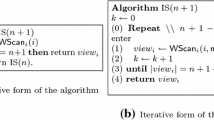Abstract
The celebrated asynchronous computability theorem provides a characterization of the class of decision tasks that can be solved in a wait-free manner by asynchronous processes that communicate by writing and taking atomic snapshots of a shared memory. Several variations of the model have been proposed (immediate snapshots and iterated immediate snapshots), all equivalent for wait-free solution of decision tasks, in spite of the fact that the protocol complexes that arise from the different models are structurally distinct. The topological and combinatorial properties of these snapshot protocol complexes have been studied in detail, providing explanations for why the asynchronous computability theorem holds in all the models.
In reality concurrent systems do not provide processes with snapshot operations. Instead, snapshots are implemented (by a wait-free protocol) using operations that write and read individual shared memory locations. Thus, read/write protocols are also computationally equivalent to snapshot protocols. However, the structure of the read/write protocol complex has not been studied. In this paper we show that the read/write iterated protocol complex is collapsible (and hence contractible). Furthermore, we show that a distributed protocol that wait-free implements atomic snapshots in effect is performing the collapses.
Full version in arXiv 1512.05427. Partially supported by UNAM-PAPIIT grant IN107714.
Access this chapter
Tax calculation will be finalised at checkout
Purchases are for personal use only
Similar content being viewed by others
References
Afek, Y., Attiya, H., Dolev, D., Gafni, E., Merritt, M., Shavit, N.: Atomic snapshots of shared memory. J. ACM 40(4), 873–890 (1993)
Attiya, H., Rajsbaum, S.: The combinatorial structure of wait-free solvable tasks. SIAM J. Comput. 31(4), 1286–1313 (2002)
Biran, O., Moran, S., Zaks, S.: A combinatorial characterization of the distributed 1-solvable tasks. J. Algorithms 11(3), 420–440 (1990)
Borowsky, E., Gafni, E.: Generalized FLP impossibility result for t-resilient asynchronous computations. In: Proceedings of the 25th Annual ACM Symposium on Theory of Computing, STOC, pp. 91–100. ACM, New York (1993)
Borowsky, E., Gafni, E.: Immediate atomic snapshots and fast renaming. In: Proceedings of the 12th ACM Symposium on Principles of Distributed Computing, PODC, pp. 41–51. ACM, New York (1993)
Borowsky, E., Gafni, E.: A simple algorithmically reasoned characterization of wait-free computation (extended abstract). In: Proceedings of the Sixteenth Annual ACM Symposium on Principles of Distributed Computing, PODC 1997, pp. 189–198. ACM, New York (1997)
Borowsky, E., Gafni, E., Lynch, N., Rajsbaum, S.: The BG distributed simulation algorithm. Distrib. Comput. 14(3), 127–146 (2001)
Fischer, M., Lynch, N.A., Paterson, M.S.: Impossibility of distributed commit with one faulty process. J. ACM 32(2), 374–382 (1985)
Gafni, E., Rajsbaum, S.: Recursion in distributed computing. In: Dolev, S., Cobb, J., Fischer, M., Yung, M. (eds.) SSS 2010. LNCS, vol. 6366, pp. 362–376. Springer, Heidelberg (2010)
Goubault, E., Mimram, S., Tasson, C.: Iterated chromatic subdivisions are coll apsible. Appl. Categorical Struct. 23(6), 777–818 (2015)
Havlicek, J.: Computable obstructions to wait-free computability. Distrib. Comput. 13(2), 59–83 (2000)
Havlicek, J.: A note on the homotopy type of wait-free atomic snapshot protocol complexes. SIAM J. Comput. 33(5), 1215–1222 (2004)
Herlihy, M., Kozlov, D., Rajsbaum, S.: Distributed Computing Through Combinatorial Topology. Elsevier, Imprint Morgan Kaufmann, Boston (2013)
Herlihy, M., Rajsbaum, S.: Simulations and reductions for colorless tasks. In: Proceedings of the ACM Symposium on Principles of Distributed Computing, PODC 2012, pp. 253–260. ACM, New York (2012)
Herlihy, M., Shavit, N.: The topological structure of asynchronous computability. J. ACM 46(6), 858–923 (1999)
Herlihy, M., Shavit, N.: The Art of Multiprocessor Programming. Morgan Kaufmann Publishers Inc., San Francisco (2008)
Hoest, G., Shavit, N.: Towards a topological characterization of asynchronous complexity. In: Proceedings of the 16th ACM Symposium Principles of Distributed Computing, PODC, pp. 199–208. ACM, New York (1997)
Jonsson, J.: Simplicial Complexes of Graphs. Lecture Notes in Mathematics. Springer, Heidelberg (2008). doi:10.1007/978-3-540-75859-4
Kozlov, D.N.: Chromatic subdivision of a simplicial complex. Homology Homotopy Appl. 14(2), 197–209 (2012)
Kozlov, D.N.: Topology of the immediate snapshot complexes. Topology Appl. 178, 160–184 (2014)
Kozlov, D.N.: Topology of the view complex. Homology Homotopy Appl. 17(1), 307–319 (2015)
Loui, M.C., Abu-Amara, H.H.: Memory requirements for agreement among unreliable asynchronous processes 4, 163–183 (1987). JAI Press
Rajsbaum, S., Raynal, M., Travers, C.: The iterated restricted immediate snapshot model. In: Hu, X., Wang, J. (eds.) COCOON 2008. LNCS, vol. 5092, pp. 487–497. Springer, Heidelberg (2008)
Saks, M., Zaharoglou, F.: Wait-free k-set agreement is impossible: the topology of public knowledge. SIAM J. Comput. 29(5), 1449–1483 (2000)
Author information
Authors and Affiliations
Corresponding author
Editor information
Editors and Affiliations
Rights and permissions
Copyright information
© 2016 Springer-Verlag Berlin Heidelberg
About this paper
Cite this paper
Benavides, F., Rajsbaum, S. (2016). The Read/Write Protocol Complex Is Collapsible. In: Kranakis, E., Navarro, G., Chávez, E. (eds) LATIN 2016: Theoretical Informatics. LATIN 2016. Lecture Notes in Computer Science(), vol 9644. Springer, Berlin, Heidelberg. https://doi.org/10.1007/978-3-662-49529-2_14
Download citation
DOI: https://doi.org/10.1007/978-3-662-49529-2_14
Published:
Publisher Name: Springer, Berlin, Heidelberg
Print ISBN: 978-3-662-49528-5
Online ISBN: 978-3-662-49529-2
eBook Packages: Computer ScienceComputer Science (R0)




